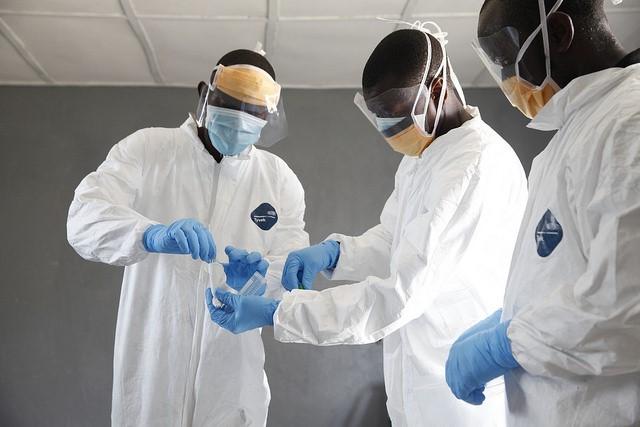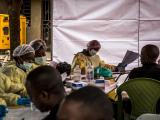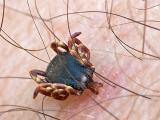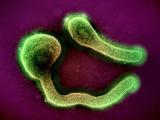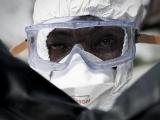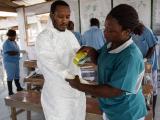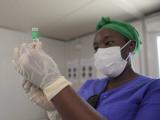In the latest Ebola outbreak developments in the Democratic Republic of the Congo (DRC), two more probable cases were reported, and the World Health Organization (WHO) fleshed out more details about the response's vaccination component.
Also, initial talks are under way about possibly using experimental antivirals for treating sick patients, and new information about the initial outbreak cluster and the tough conditions responders face were revealed in a situation report yesterday from the International Federation of Red Cross and Red Crescent Societies (IFRC).
Case total reaches 41
On Twitter today, Peter Salama, MBBS, MPH, WHO deputy director-general for emergency preparedness and response, said two more probable cases have been reported in the outbreak, raising the overall total to 41, which includes 2 confirmed cases, along with 22 probable and 17 suspected infections.
Now that regulatory and ethics groups in the DRC government have given the green light to use of the VSV-EBOV vaccine, the WHO yesterday spelled out some of the details of the upcoming immunization campaign, which will also involve a clinical trial.
VSV-EBOV was developed the Public Health Agency of Canada and is licensed by NewLink Genetics and Merck. A phase 3 ring vaccination trial at the tail end of Guinea's Ebola outbreak showed that it was highly effective.
Before DRC government officials approved its use in the country's latest outbreak, the WHO had already been laying the groundwork to use it, which includes establishing cold chain storage conditions—a challenge in a remote outbreak setting where electrical service is in short supply. Gavi, the Vaccine Alliance, had already agreed to pay for the vaccine, and in 2017, WHO vaccine advisors recommended compassionate use of the not-yet-licensed VSV-EBOV in an outbreak setting.
Getting the vaccine—drawn from a small stockpile in Geneva with more available from Merck—to the outbreak area will be a challenge, and the WHO said the DRC health ministry, Doctors Without Borders (MSF), and the WHO and its partners are working out the logistical issues. Last week, Wellcome Trust and the UK Department for International Development pledged £3 million ($4 million) to help the WHO conduct critical research during the DRC's outbreak.
Ring vaccination strategy
A ring vaccination strategy, similar to the one in Guinea, will include vaccinating contacts, contacts of contacts, international and local healthcare and frontline response workers in the hot spots, and healthcare and frontline responders in areas at risk for Ebola spread.
Participation in the campaign is voluntary, and for those who are vaccinated, immunization teams will make six follow-up visits, at 3, 14, 21, 42, 63, and 84 days after vaccination.
When WHO vaccine advisors last year recommended use of VSV-EBOV to help tamp down outbreaks, it said deployment should be used as an opportunity to gather more data on safety, efficacy, and effectiveness. It said it didn't have enough information, especially regarding duration of protection, to recommend mass vaccination outside of outbreak settings in populations at risk or for healthcare workers in those areas.
VSV-EBOV has been shown to provide rapid protection after a single dose, and, in an encouraging development, a study published April reported antibody response in vaccine trial participants up to 2 years after one dose.
The DRC cleared the vaccine for use in an Ebola outbreak last year in the remote northern Bas-Uele province, but it was never used given that officials quickly contained the outbreak, which was limited to four deaths and another four illnesses.
Moving forward with using a vaccine to treat Ebola and Marburg virus—which causes a similar viral hemorrhagic fever disease—is still a key global health goal. Last week the WHO posted a draft research and development roadmap for countermeasures against the two diseases, which is open for comments through Jun 8. The Center for Infectious Disease Research and Policy (CIDRAP), the publisher of CIDRAP News, led the writing of the draft with support from Wellcome Trust and in collaboration with the WHO.
The WHO's emergency response team is already using the guide for deploying the vaccine in the DRC's outbreak.
A role for experimental treatments?
The WHO is in preliminary talks with DRC government officials and MSF, which supports patient treatment, to see if experimental Ebola treatments should be used, Tarik Jasarevic, a WHO spokesperson, told CIDRAP News. If there's a role for new treatments, the next step would be to work through getting the needed regulatory and ethical approvals to use experimental antivirals on a compassionate basis to treat patients infected with Ebola, he said.
During West Africa's outbreak, some treatments were studied in clinical trials, which got a late start and were limited by declining case numbers.
Some of the experimental or repurposed treatments studied in West Africa's outbreak included favipiravir, an antiviral drug made in Japan. An early study done during Guinea's outbreak suggested the drug may have activity against the virus at early infection stages. The drug was approved in Japan in 2014 for pandemic flu stockpiling.
Another repurposed treatment studied during West Africa's outbreak, also in Guinea, was interferons.
Treatments developed specifically for Ebola that were studied in West Africa's outbreak included two monoclonal antibody cocktails: (1) ZMapp, developed in the United States and tested in Sierra Leone, and (2) MIL 77, a closely related product made by China that was used to treat a British nurse infected in Sierra Leone.
Also, a few trials of convalescent whole blood and plasma took place in Guinea, Liberia, and Sierra Leone.
Remote location challenges
In a situation update yesterday, the IFRC said the outbreak location around Bikoro is typically accessible by four-wheel drive vehicles, but the rainy season is still under way, making the area accessible only by motorbikes and helicopters. The IFRC report was posted on ReliefWeb, a humanitarian information portal. It said the Ikoko Impenge outbreak epicenter is a very remote village and that its health area doesn't have mobile phone coverage.
Bikoro's main economic activity is fishing from Lake Tumba, with fish transported to Brazzaville and Kinshasa via Mbandaka, the province's capital, the IFRC said, adding that people from two neighboring health zones pass through Bikoro to access the lake for fishing, posing a risk of further Ebola spread. Health officials have already warned that waterway transport along the border with the Republic of Congo and the Central African Republic poses a risk of virus spread, as well.
Though the epidemiologic investigation is still under way, the IFRC said the first case-patient in the recent cluster was a policeman who arrived from Igende, and then died in a health center in the village of Ikoki Impenge in Bikoro health district.
After the man's funeral, 11 family members got sick, and 7 died. All 7 had attended the man's funeral or cared for him while he was sick. Funeral rituals and caring for sick patients are known risk factors for contracting Ebola.
See also:
May 14 WHO vaccine FAQ
WHO backgrounder on experimental Ebola treatments
May WHO Ebola/Marburg draft R&D roadmap page
May 14 IFRC report on ReliefWeb
